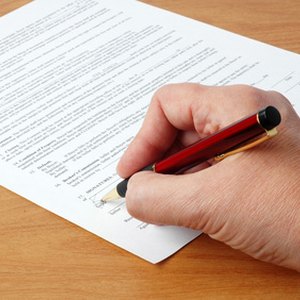
Quit claim deeds can be used to add or remove an individual from the title to property. Often this is used between parents and children or spouses. Quit claim deeds offer no warranty that the seller holds a free and clear title to the home. The specific verbiage in the quit claim deed differentiates it from other types of deeds, such as a warranty deed. Quit claim deeds should be prepared by a professional, but preparing and recording one on your own is acceptable as well.
Consult trustworthy resources, such as legal books, for the correct way to word the quit claim deed. Check with the county recorder's office for any recording requirements, such as page margins, and if the marital status is needed for the parties involved.
Speak with an attorney to verify the information to be included on the deed is correct. Many attorneys can provide deed preparation services for low fees.
Meet with the parties involved in the transfer. Generally only the grantors, the people who are currently on title, need to sign. Sign the documents in the presence of a notary public. Complete any forms that are required by the county or state.
Take the deed and any forms to the county recorder's office. Bring a check or money order to pay for the recording fees. Submit the deed to to clerk to be recorded.
Ask the clerk to provide the recording information upon completion. The recorded deed should be returned to you within a few days to weeks.
Tips
Researching the proper way to prepare a quit claim deed may take a lot of time and effort. Consulting with an attorney or online document preparation service first may save you time. Remember, deeds are legal documents, so listing an attorney's name as the preparer adds more validity to the deed.
Warnings
Each state has different recording guidelines. A document that will record in one state, might not in another. Be sure the document fully adheres to the county's recording standards before submitting.
References
Tips
- Researching the proper way to prepare a quit claim deed may take a lot of time and effort. Consulting with an attorney or online document preparation service first may save you time. Remember, deeds are legal documents, so listing an attorney's name as the preparer adds more validity to the deed.
Warnings
- Each state has different recording guidelines. A document that will record in one state, might not in another. Be sure the document fully adheres to the county's recording standards before submitting.

